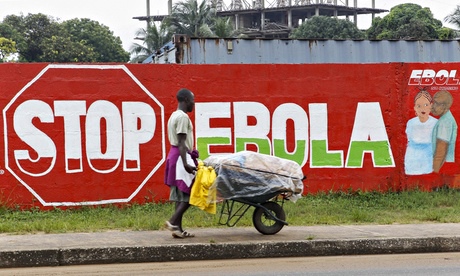
Amos Gardy is lucky. Thanks to an online course he took last month, he has educated himself about Ebola and has been busy spreading that knowledge through his community in Monrovia, Liberia.
Gardy, who has two sons, works for an NGO and runs a youth organisation in Monrovia. He undertook his study through Advance Learning Interactive Systems Online (Alison), a Massive Open Online Course (Mooc) provider that launched an Ebola learning programme in August as the outbreak raced through towns and cities across west Africa.
“It was a very great help because I had no knowledge of Ebola,” Gardy said in a phone interview from Monrovia. “Ebola has taken so many lives in our country. I learned how Ebola travels and how you can catch it.”
He owns a laptop and has access to the internet, which gives him an acute sense of responsibility.
“Not everybody has the opportunity to do the course,” said Gardy. “It’s just a few who have the internet. Those of us who can, we take our responsibility and go into the communities to educate people … The chain continues so gradually people will be aware of how to avoid the virus.”
Alison was set up in 2007 by Mike Feerick, an Irish social entrepreneur. It allows all learning, assessment, testing and verification to be accessed by anyone, anywhere for free.
As of December 2013, it had 2.5 million learners with 200,000 new users signing up every month. About 250,000 users are in west Africa; so far, roughly 10,000 people have completed the Ebola course. Feerick is hopeful that crowdsourcing can be used to translate it into regional languages, and eventually all global languages.
“We have a huge engagement on our platform,” he said. “It’s a crowdsourcing way to respond to a crisis like this, which I think is new to governments and health organisations. We have people lining up to translate this course.”
Alison has already translated the programme into French with the help of the Federation of African Medical Students’ Associations. It is hoped that an Arabic version can be produced soon.
“It’s amazing the lack of information people have. We have been appalled,” Feerick said. He added that no major NGO had yet approached them to harness their reach and knowledge, a fact he found both frustrating and somewhat predictable.
“We have the largest free learning platform in Africa, by a mile. Work with us. It’s almost cost-less for the likes of Alison to respond … They are dealing with the outbreak in a classic old-fashioned way that believes money is the answer. It’s not the answer. We have infrastructure now that was not there before. Ebola is containable. The response has to be information- and education-led.”
Feerick says most users access the course through internet cafes, laptops or workplaces. The programme can also be completed using mobile phones, and Alison has provided pdfs for people to print out and use.
For Gardy and others living on the frontline of this global health emergency, knowledge is powerful but fear remains a constant presence. It is not just the immediate worry of catching Ebola, but also concern about what the virus is doing to Liberia’s already fragile future prospects.
“It is very worrisome. The Ebola virus has become an economic virus. There are no jobs, no investors,” he said.

